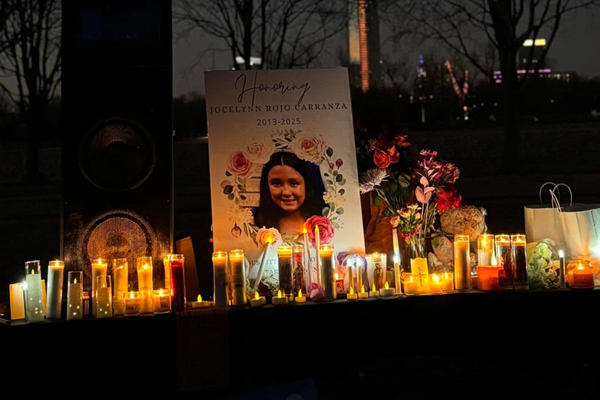
Late last year, Pablo Ortez quit his job, sold his belongings and prepared to join his wife in Japan, where she is studying for a doctorate.
But 72 hours before he was due to leave Argentina, he checked the Japanese foreign ministry website to find that the government had imposed a near-blanket travel ban to prevent the spread of the Omicron variant of coronavirus.
“I called the Japanese embassy and they said I couldn’t fly,” said Ortez, who has moved in with his mother and does not know when he will be able to join his wife, whom he has not seen since she visited Argentina last April.
The 33-year-old is one of tens of thousands of people with plans to study, work or join relatives in Japan who now find themselves “locked out” of a country that has maintained some of the world’s strictest travel restrictions throughout the pandemic.
The latest measures, imposed at the end of November, apply to all arrivals except Japanese citizens and returning foreign residents – new students, guest workers, technical interns and, in some cases, the foreign spouses and children of Japanese nationals.
Lewis Hussey had set his heart on studying in Japan before he graduates from university this summer. But the travel ban means the Missouri-based student has had to drastically rethink his plans.

“It’s incredibly disappointing,” Hussey, 26, said. “There have been times when it looked like Japan was about to open up, and then it didn’t. It’s frustrating because I could have considered other places. I feel like I’ve been cheated out of the opportunity to study abroad because of the inconsistent and nonsensical approach of the Japanese government.”
The World Health Organization has urged countries not to impose blanket travel bans, warning that they were ineffective in preventing the spread of the virus and created economic and social misery.
Japan’s prime minister, Fumio Kishida, is unlikely to make significant changes to the border policy, however, after a recent poll showed 88% of the public believed the measure was “appropriate”.
But it has not prevented Omicron from taking hold in Japan, which reported a record 46,000 new cases of Covid-19 on Thursday. This weekend, large parts of the country, including Tokyo, will enter a quasi-state of emergency to relieve pressure on health services.
Japan has imposed tight travel restrictions throughout the pandemic, with moves to relax them quickly undone by waves of infections driven by new variants. The only exception came last summer, when tens of thousands of athletes, officials and journalists arrived for the Tokyo Olympics.
Aware of how mismanagement of the pandemic helped topple his predecessor, Yoshihide Suga, Kishida is hoping that travel restrictions will play well among voters during upper house elections in July.
Kishida recently said the ban would be extended until the end of February, but Jade Barry is bracing herself for more delays.

The 29-year-old was poised to fulfil her professional ambition of expanding her hairpiece business when the latest ban went into effect, forcing her to drop plans to scout locations in Tokyo for her new outlet.
“I was devastated,” Barry said from her home near Chicago. “I cried all day and my kids were wondering what was wrong with mom.
“I have been in love with Japan since I was little. Expanding my business there was a way of realising my ultimate goal of starting a life there. I still believe it’s a beautiful country, but to be banned for so long means I feel resentment towards the government.”
Stranded students have found little sympathy among Japanese politicians but have received support from some business leaders, who say the ban will stifle innovation and threaten Japan’s long-term interests as more students look to other countries, including economic rivals such as South Korea.
Hiroshi Mikitani, chief executive of the e-commerce group Rakuten, has likened the ban to the isolation brought by the sakoku “locked country” policy during the Edo period (1603-1868). On the day Kishida extended the restrictions, Mikitani tweeted: “What is the point of not letting in new foreigners now? Do you want to shut Japan off from the rest of the world?”
A letter to Kishida signed this week by hundreds of academics and experts in Japan-US studies, urged his government to relax border controls to allow educators, students and scholars to enter Japan.
“They become the bridges between Japan and other societies. They are future policymakers, business leaders and teachers,” the letter said. “They are the foundation of the US-Japan alliance and other international relationships that support Japan’s core national interests. The closure is harming Japan’s national interests and international relationships.”
“It’s frustrating,” said Imane, a 20-year-old Canadian student who has waited two years to begin her Japanese-language studies in Tokyo. “It’s been two years of wasting time, waiting for Japan to open its borders.
“I love Japan so this is heartbreaking, but I can’t spend my whole life waiting,” added Imane, who preferred to use only her first name. “If Japan doesn’t open its borders this year I’m going to have to look elsewhere.”
Her frustrations are shared by Vilhelm, a student from Lithuania, who gets up at 4.30am for online classes in international business studies at a university in Tokyo.

“The most frustrating part is that I can see no end to this,” said Vilhelm, who asked that his surname not be used. “I’ve invested in studying in Japan and I feel like it is treating me very unfairly. I still love Japan, but sometimes I forget why.”
Barry took to social media to rally students and other stranded people behind a campaign to end the restrictions, with protests outside Japanese embassies planned for later this month.
“To have the opportunity to come to Japan ripped away is devastating. And I can’t imagine what it’s like not to be able to see your child because of border restrictions. The uncertainty is no longer acceptable. This is literally ruining people’s lives.”
The government responded to mounting criticism by opening the door, if only by a fraction. It will allow 87 students on government scholarships to enter in February, the chief cabinet secretary, Hirokazu Matsuno, said last week. But that leaves almost 150,000 others, mostly privately funded, who have been waiting up to two years to begin their studies.
They will continue to live in limbo, unsure of when they will be able to begin their new lives in a country that has effectively become a Covid hermit kingdom.
“Japan is damaging its soft power and its economy because it is punishing people who have a genuine interest in the country,” Ortez said. “It’s ruining its reputation. This will have long-term consequences for Japan.”







